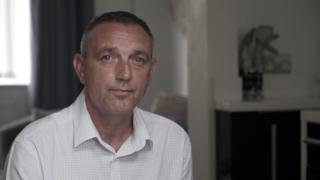
Before lockdown, Chris McLone was looking forward to a good year.
In his late 40s, he felt fit and healthy, enjoying life with a successful career as a sales manager,
Always a very social person, Chris enjoyed nights out with friends and going to the football. Alcohol played a part in his life but he never viewed it as a problem.
But within weeks of lockdown, Chris, who lives on Teesside, had gone from being someone who enjoyed a drink to someone who needed a drink.
“I suppose I’ve always been a social drinker – I was never within the limits, the recommended limits, and so yeah, I used to enjoy a drink, sometimes a little bit more than I should, as a lot of people do.
“I was in a good place before lockdown, I was keeping fit, I was swimming five days a week, I was doing well at work and I was in a good mindset to be honest.”
His adult daughter, a key worker, moved out during lockdown to protect her dad, but that left Chris living on his own – isolated, anxious, uncertain about the future and growing increasingly depressed.
The weeks dragged on and Chris’s drinking escalated.
Chris says he began experiencing withdrawal symptoms at the very end. “Although I wanted to cut down and stop at that point, I wasn’t in control of that. And that was the frightening part.
“I’ve never been like that in my life and I had to admit that to myself. So I was drinking very early in the morning to stop withdrawal symptoms.
“I promised myself I wouldn’t do it again tomorrow. Of course, the exact same thing happened the next day. And that’s when I realised I had to take big steps to get some proper treatment.”
With the help and encouragement of his family, Chris turned to the Steps Together drug and alcohol rehabilitation service in Leicestershire.
He’s been sober now for more than 70 days, determined to lay his demons to rest.
“Where I was before, it was just a horrible dark place I was in and sobriety is just fantastic. I can’t explain how good I feel.”
‘Every day is Friday’
One of those who helped Chris get his life back together was GP Dr Rob Hampton, who specialises in addiction services.
He says they’ve seen a marked increase in people in need of help and that Chris’s story is far from unique.
“When listening to the stories, these were people who, a few weeks ago, were actually functioning very well, holding down jobs, living normal, day-to-day lives.
“Within three weeks they’d become dependent alcoholic drinkers and needing detoxification rehab.
“If you look at what lockdown meant to people’s lives – so first of all, having to get up every day to go to work and take the kids to school – all of that just stopped.
“Somebody described it perfectly to me – ‘Every day is Friday night now’ – and there’s no reason to get up in the morning.
“You add that to the isolation some people were feeling, the job insecurity, all sorts of stresses and strains in relation to the uncertainty for the future.
READ RELATED: This Is the #1 Best Tea for Cancer Patients, New Research Suggests
“But even those who were furloughed and felt more confident about their work, their kids were at home, they were having to get involved in home schooling.
“There was just that need for a stress-buster every day.”
All of this is familiar to the British Liver Trust, one of the UK’s main charities dealing with the medical consequences of alcohol abuse.
Its helpline has seen an increase in calls of 500% since lockdown began, an indication of how many people have found their drinking has escalated out of control.
But this comes on the back of an already huge increase – up by 400% – in deaths due to alcohol-related liver disease since 1970.
The statistics make for grim reading: every day, more than 40 people die from liver disease in the UK. It is the third biggest cause of premature death in the UK and the biggest cause of death in those aged between 35 and 49.
Vanessa Hebditch, policy director at the charity, says lockdown has only accentuated the need for a proper alcohol strategy from government. “We need to address the public health measures, the population-wide issues.
“So that’s about increasing taxation, introducing, for example, a minimum unit price, but it’s also addressing advertising, marketing and things like labelling so consumers have a real choice, and understand what alcohol includes.
“It’s absolutely crazy that I can buy a bottle of milk and get all sorts of nutritional and calorie information, and yet I can buy a bottle of beer or wine and get nothing.”
The governments in both Scotland and Wales have introduced a minimum unit price (MUP) of 50p for alcohol sales.
In March of this year, the government in England said there were “no plans for the introduction of MUP in England” although it would continue to monitor the progress in Scotland and consider the evidence of its impact.
‘Not a stigma now’
Of course, not everyone found they were drinking more during lockdown.
In June, the National Survey for Wales found that 31% of those who took part reported drinking less than before lockdown.
Across the UK, health services in all four nations reported that while the number of people trying to access alcohol support services fell during the initial phase of the pandemic, referrals are now getting back to normal levels.
And for those who have found themselves in trouble, support is out there.

Media playback is unsupported on your device
Nick Davis, who’s in his late 50s and from West Yorkshire, is now more than 500 days sober but says he is always only an hour away from a return to alcoholism.
Like Chris, he found lockdown and the chaos of the pandemic hard to cope with. But distractions – caring for his dog, playing his guitar – kept him going.
And he offers these words to those who might be struggling: “I think the best advice I could give is, just be honest. Be honest with yourself, be honest with everybody else, tell everybody else what you’re going through.
“It’s not as much of a stigma now as it was in the past, it’s an illness.”
- SURVIVING THE VIRUS: ‘Our medical science is struggling to catch-up’
- COVID-19: How are dentists coping?
Source: BBC News – Health









